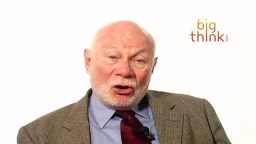Lionel Tiger
Professor of Anthropology, Rutgers University
Lionel Tiger is the
Charles Darwin Professor of Anthropology at Rutgers University and a consultant to
the U.S. Department of Defense on the future of biotechnology. An expert on the biological roots of human social behavior, he is the author of numerous books, including The Decline of Males, The Pursuit of Pleasure and The Manufacture of Evil: Ethics, Evolution, and the Industrial System. He originated the term "male bonding" and is an advocate for "male studies" departments in universities.
Go to a park on the Upper West Side or in Cleveland or in China and you see exactly the same behavior because you know what - same organism.
Lionel Tiger: Christmas is perhaps the most popular holiday in the world because it gets right to the bedrock of what religion is about, which is you’ve got to take care of the mother and the child.
If you’re a hunter-gatherer, as we are, you better get up in the morning and think it is a great day to catch an elephant.
There are 4,200 religions in the world, each of them believing they’re absolutely correct and everyone should follow their views.
In his work with the government, the professor helps to suss out the underlying motives of our allies and enemies.
▸
2 min
—
with
As in real estate, the name of the game in our choice of spouse is “location, location, location.”
▸
7 min
—
with
Masculinity was partly to blame for the obscure financial instruments that caused us so much grief.
▸
8 min
—
with
Drugs like Ritalin essentially work to make male behavior more female-like.
▸
6 min
—
with
Some animals exhibit behaviors that are not unlike our religious ceremonies.
▸
4 min
—
with
Some religions are better than others in providing a peace of mind, a sense of social comfort, a sense of decency.
▸
5 min
—
with
“When you’re dealing with theoretical issues like who serves God better that becomes rapidly rather frightening and unattached to any reality.”
▸
3 min
—
with
Sex can cause “all sorts of ruckus in all sorts of lives on an endless basis.” That’s why religions make a point of regulating it.
▸
3 min
—
with
“People who are religious might well be healthier because they help each other more.”
▸
5 min
—
with
Believing in God generates soothing “juices” in the brain that make us feel good.
▸
5 min
—
with
A conversation with the Darwin Professor of Anthropology at Rutgers University.
▸
47 min
—
with














